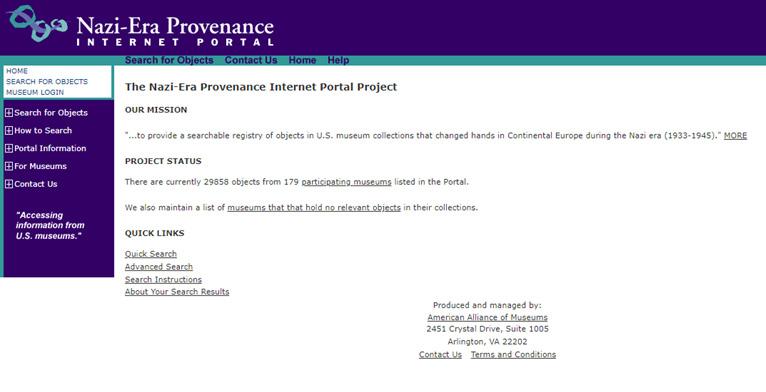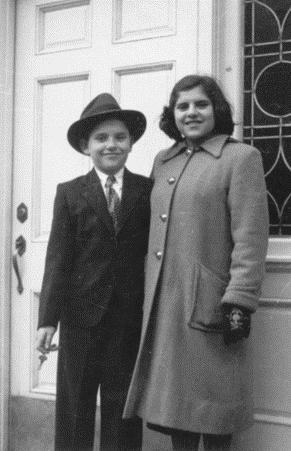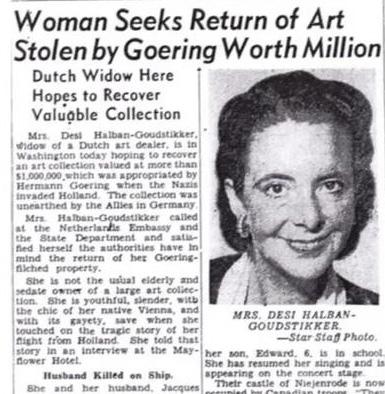
5 minute read
Successful Escape from Germany to American Success
My father, born as Manfred Reichenberg on July 20, 1912, was the sixth generation of his family to live in the same house in the Hessian village of Windecken, Germany. The picturesque village of 4,000 souls was 650 years old, complete with a small castle. Jews comprised about 10 percent of the population. The synagogue and cemetery were about 500 years old. Relations between Christians and Jews were excellent into the early 1930s, then gradually deteriorated over that decade. Those Jews who did not leave by 1940 were sent to a camp in France, starved, and later murdered.
Manfred’s father, Salli, was a decorated WWI combat veteran. His mother’s family had owned a dry goods and furniture shop near the main square for generations. Dad’s earliest memory was his first day of first grade in the autumn of 1918. The class was instructed to tear the Kaiser’s picture out of each textbook. The eighth grade was followed by two years of apprenticeship, for my father it was in clothing sales in Frankfurt. He sold clothing in a shop in Grossen-Linden, south of Giessen. In 1937, five or six SA (Sturmabteilung, Assault Division) “Brownshirt” thugs from the neighboring village waited for him outside. As he left to deliver a coat, they beat him with blackjacks. He thought they would murder him, so he told them to hang him “one-and-half meters high, so you won’t have to bow down to kiss my ass.” He suffered lifelong damage to his ears, headaches, and other issues. The local doctor, a Nazi party member, refused to believe he was attacked or treat his injuries.
In the 1930s, Nazi policy was expulsion of Jews. But no Western country wanted refugees, especially the US. One hurdle in the immigration law was a requirement for an affidavit from an American proving the ability to financially care for the refugee, if needed. Interestingly, in 1902, 15-year-olds Salli Reichenberg and Herman Stern were apprenticed to a clothing store for three years. There was a “high fee” for early departure, more than either boy’s family had. A year later, a family friend who owned a department store in North Dakota sought an employee for his expanding business who might also be a marriage prospect for his wife’s sister. Salli helped Herman flee. Herman did marry the sister, inherited the chain of stores, and was a wealthy civic leader and friend of ND Senator Nye. With Nye’s help, Herman vouched for over 100 relatives, saving most. He repaid Salli with the youthful escape of Manfred, my dad.
Manfred took a train to Hamburg and then sailed 3rd class, departing April 30, 1937, and arriving in New York on May 8. Manfred worked as a custodian in a Brooklyn hospital and sold life insurance door-to-door. He married Ilse on December 25, 1942, just before reporting to Camp Gordon for Basic Training and initial unit training. While there, he became a U.S. citizen in the Augusta courthouse, “reborn” as Fred M. Bergen. He never spoke about his 1930s Germany experiences.
Dad served as a Sergeant First Class in the 239th Engineer Construction Battalion in New Guinea and the Southern Philippines campaigns, earning Purple Heart and Bronze Star medals. He served in the Pacific Theater for 24 months and was honorably discharged on January 26, 1946.
The family moved to Charlotte in 1949. For three decades, Fred Bergen sold men’s clothing to almost every department store, dry goods store, men’s clothing store, and PX/BX in South Carolina, when those were locally owned independent stores. Twice yearly, he worked in nearly every city and town in the state.
In 1988, his home village celebrated its 700th anniversary and invited back
newly-wed couple and it became clear that they wished to get out from behind what was soon to be the “iron curtain.” Despite the language barrier, my dad understood important to him. He just needed to help them. So he went back up the hill to the hotel where he had dinner and acquired a bottle of vodka to be used as a bribe for the Russian guards. After stowing the couple away in the back of the deuce and a half he was driving (a two-and-a-half-ton truck) occupied Germany. Only the family of this young couple knows of their ultimate fate but they now were free from the postwar
Today, perhaps we need to look back The rise to power of the Nazi and fascist governments and the imperialist ideology of the Japanese were primary causes of this genocide. Maybe now we will understand how truly fragile democracy was and LES BERGEN
My dad, Warren Joseph Chamberlain, was not a hero, just a young man answering the “call”. Dad became an adult during the war and was a caring, understanding and open minded person. Dad came home, surviving Jewish citizens, as it was also the 50th anniversary of the destruction of the village’s synagogue and Jewish shops. Thirty- one former citizens were treated to a week of welcoming speeches, receptions, and tours. What really induced many to return was an emotional Q&A session with a group of high school students, grandchildren of the Nazi generation. Near the conclusion, one kid pointed out “they look like our grandparents, only shorter. They speak the same [pre-TV] local dialect.” While there, three former Hanau schoolmates invited Dad to lunch. He learned nearly all his Christian classmates died fighting in Russia during WWII. Meanwhile, Dad lived to the age of 77, married for 47 years, with two sons and two grandchildren. He was forever grateful to find a welcome home in the Carolinas. Dad died in Charlotte, NC on December 26, 1989. ■
Fred Bergen at Charlotte Merchandise Mart, 1981. Windecken village square depicted in 1910. Our family house and shop was a few hundred feet from this scene. In the 1980s, the government assisted in having the plaster removed from 17th century houses, exposing half-timber structures.


Tech Sgt Fred Bergen in the Philippines, 1945.
Les Bergen is a Citadel alumnus retired from staff of Headquarters, U.S. Army. His wife, Jane Banov Bergen, served 34 years in office of Sen. Fritz Hollings.










